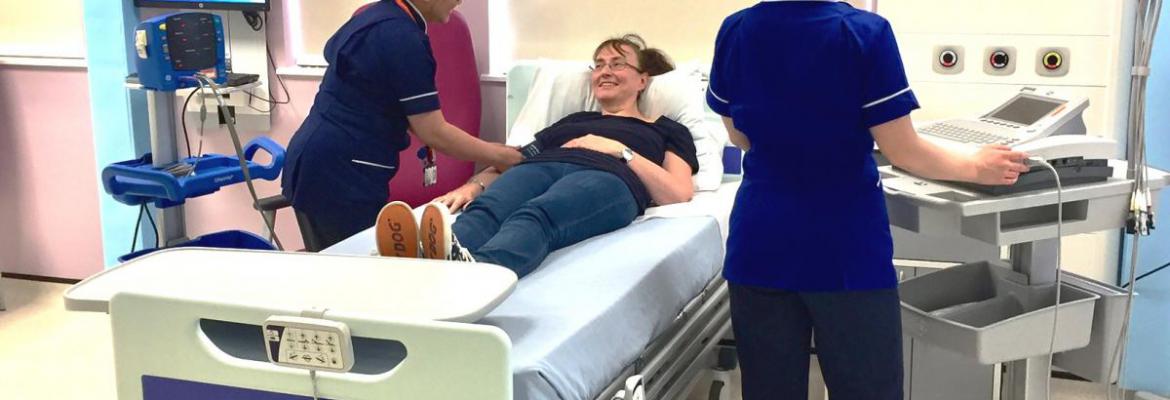An insight into the specialty, from a trainee perspective, by Dr Jennifer Harrington (Previous Trainee Representative)
Medical Oncologists assess and treat patients with a wide variety of solid organ malignancies, predominantly with chemotherapy or more recently-approved targeted agents. We use treatments intended to cure patients of their disease (often alongside Clinical Oncologists and surgical colleagues), extend patients’ lives, and/or palliate symptoms to optimise quality of life.
Medical Oncology trainees will typically rotate from one cancer type to another every six months, allowing adequate time for both broad and deep training in each subspecialty. The majority of a Medical Oncologist’s practice is outpatient-based, and trainees will be expected to attend around three such clinics per week where they will see new patients, patients already on Oncological treatments, and patients who are being actively followed up to efficiently detect and manage recurrence, or for symptom palliation. Comprehensive multidisciplinary team meetings occur weekly for each subspecialty, enhancing training through exposure and contribution to the decision making process for patient care. In these meetings, trainees will typically be exposed to the intersection of oncological, surgical, medical specialist, radiological and pathological opinions, where holistic care decisions are made. Trainees also work closely with the comprehensive (community- and hospital- based) Palliative Care service. Each subspecialty usually has its own specialist nurse, providing invaluable support for patients and the Medical team.
Another important facet to training is experience in Acute Oncology, where we assess and manage myriad complications of both cancer and the treatments we use. This is managed quite differently on each clinical site. In Addenbrooke’s Hospital, for example, there is a six-bedded Cancer Assessment Unit, which allows for specialised emergency care from 8am to 8pm. Trainees are expected to provide the medical cover for this unit and for appropriate patients in the Emergency Department when on call. Trainees also provide advice, when required, to nurses who manage a 24 hour triage helpline for Oncology patients. Addenbrooke’s Hospital has a 34-bedded Oncology ward, where a wide variety of patients are managed, including patients having elective chemotherapy, those admitted as emergencies (the mainstay), and patients receiving end-of-life care. These patients are managed on a day-to-day basis by a rotating clinical team, led by an on-call consultant and ward-based Oncology trainee. Trainees also see in-patients from their own subspecialty at least twice a week, usually on a consultant-led ward round, and are available for specialist advice for these in-patients at other times. The in-patient ward typically has three FY2/CT1-2/Clinical Fellow-level doctors at any one time during the day, and one such doctor provides out-of-hours cover for existing in-patients and emergency admissions. Higher trainee on call shifts are for 24 hour (weekday) or 48 hour (weekend) periods, and much of the late evening/night part of the on call can be performed from off-site. There is usually ample time for adequate rest during these shifts.
One morning per week is set aside for valuable educational/academic activities. This includes a dedicated Oncology Radiology meeting, widely regarded as highly educational. This is followed by trainee-focussed subspecialty teaching, usually led by a Consultant. Departmental and research meetings and talks follow, and there is usually enough time left for administrative tasks. There is a monthly journal club where practice-changing papers are reviewed and discussed. Ad hoc (protected) training days also occur, currently annually. Effective use of study leave is strongly encouraged. Educational supervision in Medical Oncology is close, relevant and useful, and the ARCP process is logical and straightforward.
Evidence-based clinical practice changes frequently in Oncology, and Medical Oncology trainees are expected to become, and remain, up-to-date with these developments. The other side of this coin is that involvement with clinical research, usually through identification of patients suitable for on-going trials of novel or repurposed drugs, and their management on these trials, is expected from trainees. Medical Oncology is perceived as a particularly academic specialty, and the large number of our Medical Oncology trainees that complete PhDs before CCT underlines this. The region affords many opportunities for research towards a higher degree, particularly at the world-class cancer research hub on the Cambridge Biomedical Campus where Addenbrooke’s Hospital is based, and trainees are invited to the whole gamut of talks that take place on site from local, national and international experts. Day-to-day practice, in addition to involvement in clinical trials, affords ample opportunities for trainees to become involved in, and lead, research studies. While the clinical workload can be unpredictable, there is usually sufficient time for trainees to actively and effectively engage in this manner. Many trainees will ultimately present their research at conferences or submit it for publication.
Medical Oncology is a highly rewarding specialty, and no two days are ever the same. It is unpredictable, which helps makes it exciting and interesting. Treatments change rapidly, and trainees are therefore always learning. Trainees are remarkably well supported by their consultant colleagues, who are not only approachable and more than happy to help and teach, but also allow trainees to establish plenty of clinical independence. Probably the most remarkable part of training is the special relationships one builds with patients and their family, often right through from diagnosis to the end of life. To integrate this journey with clinical expertise and technological breakthroughs is the true art of Medical Oncology.
